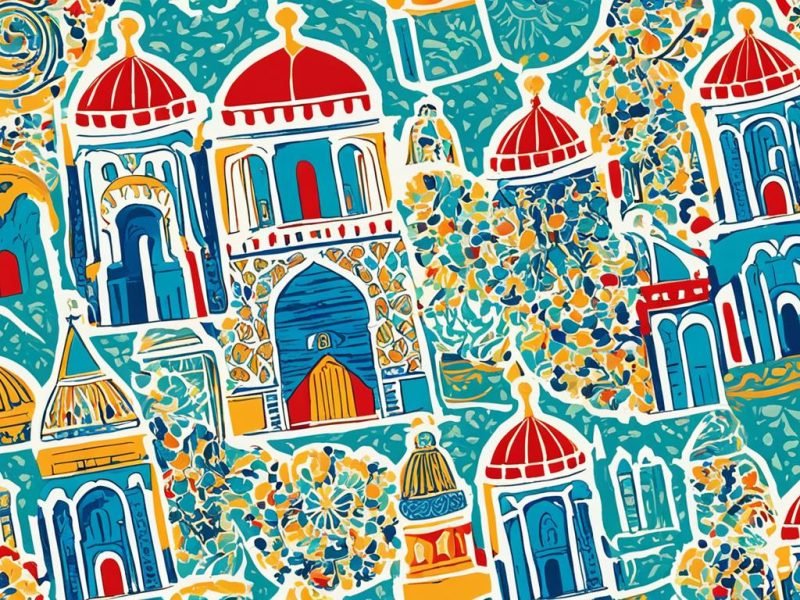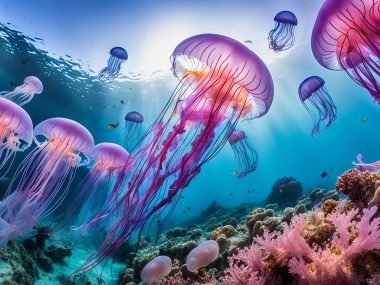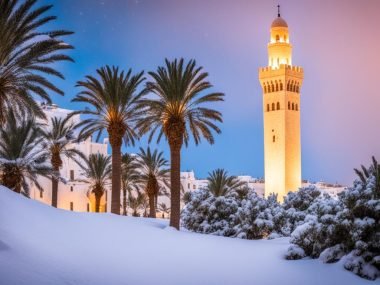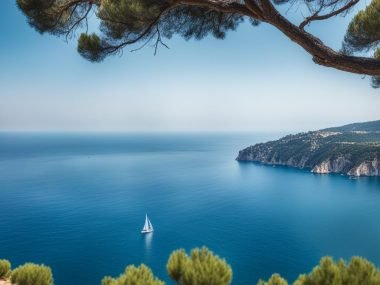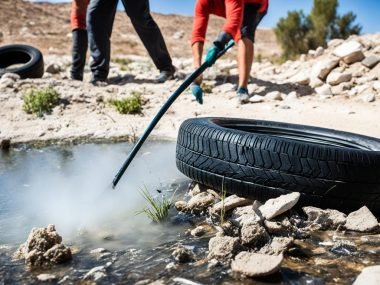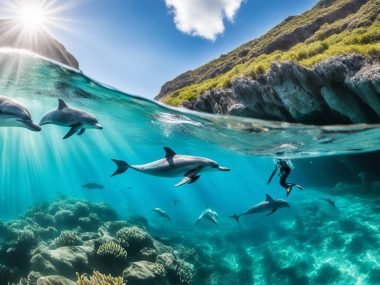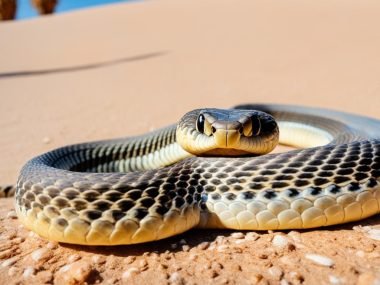Did you know about 37% of folks think Tunisia is in Europe? This mistake mixes up Tunisia’s real place with its European links. We’re looking at if Tunisia is a European country. This will help clear up misunderstandings. Tunisia is in Northern Africa. It has a rich mix of culture and history. It’s close to Europe but is truly African.
Key Takeaways
- Tunisia’s identity is often misunderstood due to its proximity to Europe.
- Geographical misconceptions lead some to incorrectly classify Tunisia as a European country.
- Located in Northern Africa, Tunisia is an integral part of African geography.
- Despite European influences, Tunisia’s history and cultural identity are deeply rooted in Africa.
- This article will explore Tunisia’s geographical, cultural, historical, and political identity.
Geographical Location of Tunisia
Tunisia is in Northern Africa and mixes African and Mediterranean cultures. It is at 34°N 9°E. This spot is central in the Maghreb region. It has land and sea borders around it.
Tunisia’s Coordinates
Tunisia sits at 34 degrees north and 9 degrees east. These numbers show it is a big part of Northern Africa. They show Tunisia’s importance in culture and strategy on the continent.
Neighbouring Countries
Algeria is to Tunisia’s west and Libya to its south-east. The north and east sides touch the Mediterranean Sea. This sea and the nearby countries show Tunisia’s big role in the area.
North Africa and the Maghreb Region
Tunisia is in the Maghreb region of Northern Africa. The Maghreb has countries like Algeria, Libya, Mauritania, Morocco, and Tunisia. They share a lot of history and culture. The Mediterranean Sea to the north links Tunisia with Europe and Africa.
The Historical Background of Tunisia
Tunisia’s history is full of different cultures and societies. It shows the complex and rich past that created the country we know today.
The Influence of Ancient Carthage
When we look at Tunisia’s past, we must think about Ancient Carthage. Carthage was a major force in the Western Mediterranean. It controlled many sea trade routes. It also fought big battles like the Punic Wars against Rome. The mark of Carthage is still seen in Tunisia today.
Roman and Ottoman Rule
After Carthage fell, the Romans took over. This made Tunisia a part of the Roman Empire. The Romans built a lot, like the El Djem amphitheatre, which we can still see.
Then the Ottoman Empire took control. This started a new chapter in Tunisia’s tale. The Ottomans brought Islamic culture. They mixed new ways with old traditions in Tunisia.
Independence from the French
The French took over Tunisia in the late 1800s. French culture influenced Tunisia a lot, from language to laws. But people in Tunisia wanted to be free. They got their independence in 1956. This freedom helped Tunisia keep its traditions while also being modern.
Is Tunisia European Country?
Many people get confused about where Tunisia belongs. It has a rich past with Europe. But, it is in Africa, on the northern tip. This part of Africa is called the Maghreb region.
Why do people think Tunisia might be European? It has history with many European places. Think about Ancient Carthage and the time of Roman and Ottoman rule. There was also a time under French control. You can see Europe’s touch in Tunisia’s buildings and culture. But still, Tunisia is in Africa.
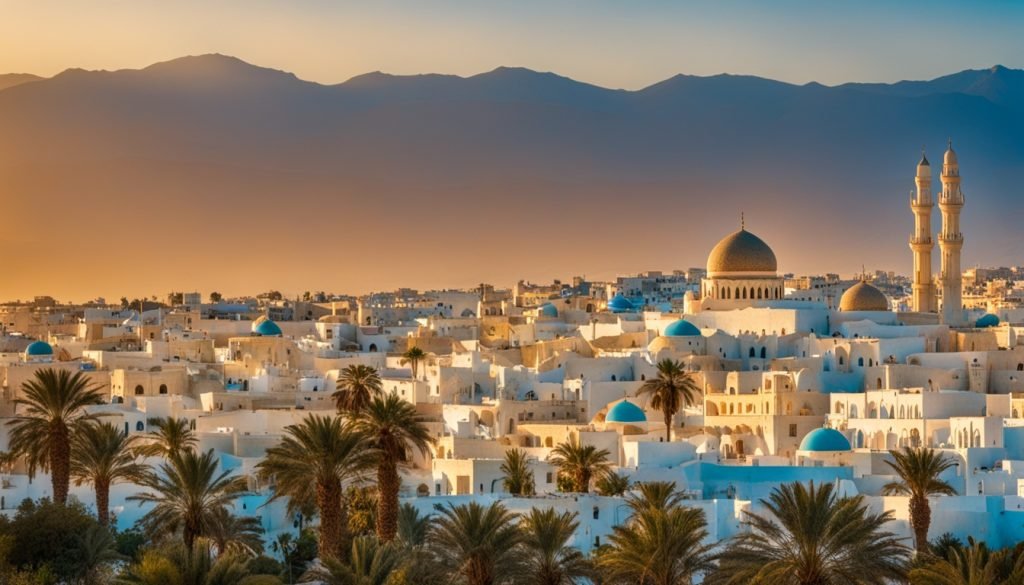
Tunisia has shared a lot with European countries over the years. But, it’s important to say it is in Africa. This is about where it is on the map and its history. Even with Europe’s influence, Tunisia’s heart is in Africa.
| Aspect | European Influence | African Identity |
|---|---|---|
| Historic Governance | Roman, Ottoman, French | Independence, African Union Member |
| Cultural Influence | Architecture, Language, Cuisine | Local Traditions, Berber Heritage |
| Geographic Location | Mediterranean Connections | Maghreb Region |
To sum up, Europe has left its mark on Tunisia. But, it is clearly part of Africa. This fact is important for understanding where Tunisia truly belongs.
Tunisia and the European Union
We’re looking at how Tunisia and the European Union are connected. Their relationship is deep, covering economy, politics, and society. It shapes how they work together in many ways.
Economic and Trade Relations
Tunisia and the EU have strong economic ties. The EU is Tunisia’s main trading partner. They help each other’s economies grow through trade. After COVID-19, they focused on recovering and becoming stronger together.
Political Cooperation
Tunisia and the EU work closely in politics. They aim for stability and good governance. They tackle challenges together, making their partnership strong.
Human Rights and Civil Society
Improving human rights is key in the Tunisia-EU relationship. They run projects to help society and promote freedoms. This shows their commitment to fairness and better governance.
We’ve given you a quick look at their rich relationship:
| Aspect | Details |
|---|---|
| Economic Relations | Top trade partner, significant EU grants, post-pandemic resilience |
| Political Cooperation | Strengthened alliances, democratic governance, regional stability |
| Human Rights | Promotion through initiatives, support for civil societies |
Demographics and Culture
Tunisia is a nation full of demographic diversity and rich cultural heritage. It boasts various ethnic groups, languages, and religious practices. These add much to the nation’s identity.
Ethnic Groups
Most Tunisians are Arabs, showing the strong Arab influence over centuries. Yet, there is a significant Berber community too. Places like Matmata and Djerba highlight this mix. It shows Tunisia’s diverse population well.
Languages Spoken
Arabic is the main language in Tunisia, spoken by nearly everyone. But French is also common, thanks to Tunisia’s past with France. It shows in business, schools, and the media. This mix highlights Tunisia’s linguistic and cultural heritage.
Religious Practices
Most Tunisians follow Sunni Islam, which affects the country’s culture a lot. However, there are also Christians and Jews in Tunisia. This shows how Tunisians respect many religions. It reflects Tunisia’s open cultural spirit.
Learning about Tunisia’s demographic diversity, languages, and religions helps us understand its complex identity. It makes Tunisia a fascinating North African nation.
Comparing Tunisia’s Climate with Europe
Tunisia has a special climate that is different yet similar to Europe. Let’s explore the details of these differences and similarities.
Mediterranean Climate
Tunisia’s north has a warm, dry summer and a gentle, rainy winter. This is much like Southern Europe. Countries like Spain, Italy, and Greece have similar weather.
Seasonal Variations
Seasons in Tunisia change a lot, showing its varied environment. In summer, it gets very hot inland. But, the sea keeps the coast cooler.
In winter, the north gets most of the rain. This is different from Europe’s often dry, cold winter.
Regional Differences within Tunisia
Climate varies across Tunisia. The north has mild weather good for farms. However, the south faces the tough Sahara desert.
This contrast in climates makes Tunisia unique. It has different weather than many places in Europe.
| Aspect | Tunisia | Southern Europe |
|---|---|---|
| Summer Temperature | 30-35°C | 25-30°C |
| Winter Rainfall | 75-150mm | 500-1000mm |
| Coastal Influence | Moderates temperatures | Moderates temperatures |
| Desert Climate | Southern Tunisia | Rare |
International Relations
Tunisia is a key player in global relations. Its location and history with African and European countries help a lot. It is well-known for making strong international friendships.
Tunisia’s Role in Global Organisations
Tunisia is part of the United Nations and the African Union. It plays a big role in world diplomacy. Its work aims to support peace, safety, and growth worldwide.
Strategic Partnerships with European Countries
Tunisia works closely with countries like France and Italy. This has led to many important deals. These deals help Tunisia’s economy and its position in Europe.
Tunisia’s Non-NATO Ally Status
Tunisia is a major non-NATO ally of the USA. This shows it has a strong and vital relationship with the USA. It helps keep the region stable and safe. Tunisia gets to use better military training and gear because of this.
Economic Ties with Europe
Tunisia is getting closer to Europe through trade and investments. This brings many advantages. Its place between Africa and Europe is very important for trade.
Trade Agreements
Many agreements help Tunisia and Europe trade more easily. Goods and services move freely. These deals open up Europe to Tunisian products. They also let Tunisia use European tech and ways of working.
European Investments in Tunisia
Europe puts a lot of money into Tunisia. They invest in energy, telecoms, and making things. This money and knowledge help Tunisia grow. They also create jobs for people.
Impact on Local Economy
Europe’s relationship with Tunisia really helps Tunisia’s growth. Money and deals from Europe support big projects. They help with schools and green efforts. This makes the local economy better. Trade between Tunisia and Europe makes life better there.
Tourism and Cultural Exchange
Tourism in Tunisia offers lots to see and do. It mixes history and lovely views well. This makes Tunisia perfect for those who love to explore and learn.
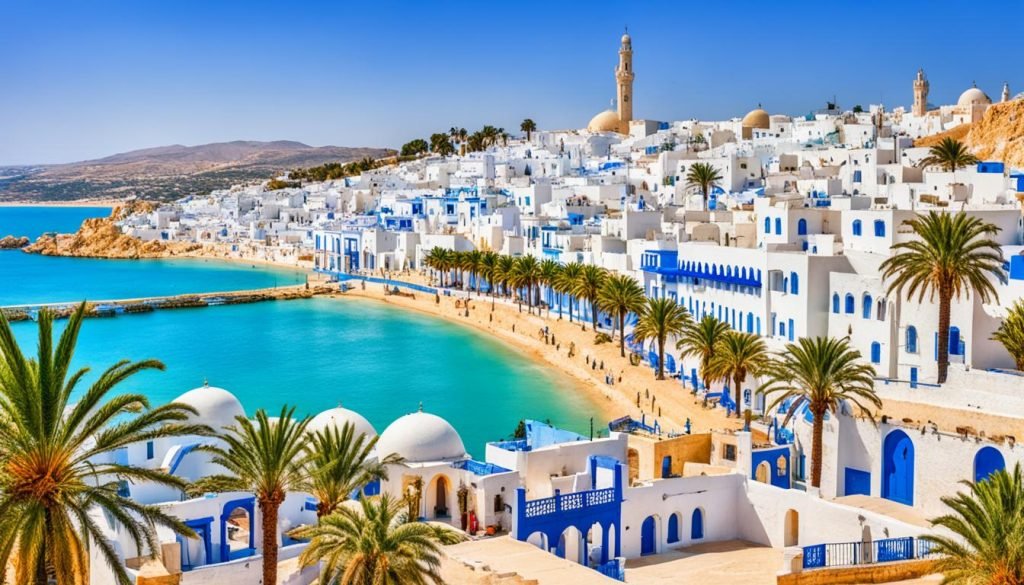
Tourist Attractions and Historical Sites
Tunisia is home to many cultural heritage sites. These include the old ruins of Carthage. They also include the huge Roman amphitheatre in El Djem.
Don’t overlook Sidi Bou Said’s beauty or the vast Sahara Desert. Together, they show Tunisia’s rich variety.
European Tourists in Tunisia
Many European tourists love visiting Tunisia. They come from countries like France, Germany, and Italy. They’re drawn by Tunisia’s mix of African and Mediterranean vibes.
The sunny weather, beaches, and history are very appealing. They cater to those looking for fun and peace.
Cultural Events and Festivals
Tunisia also hosts many international festivals. The Carthage Film Festival is one major event. So is the International Festival of Sahara in Douz. These show movies, music, and arts.
Such events help Tunisia connect Africa and Europe. They build understanding and bonds. Tunisia’s tourism offers a deep dive into its lively culture and history.
Conclusion
Tunisia is a unique country with a mix of Euro-African ties. It has strong ties to Europe but is also part of Africa. This special position lets Tunisia connect these two different worlds. This adds to its culture and economy.
The country’s past is filled with stories from ancient Carthage, Roman and Ottoman times, and gaining freedom from French rule. This history has shaped Tunisia today. It has diverse people and rich cultural traditions. There’s a mix of languages and religions, showing Tunisia’s varied identity.
When we look at Tunisia’s weather, we see it has Mediterranean and desert features. This makes its climate different from Europe in some ways. Tunisia works closely with Europe in business and tourism. This helps both sides grow.
Tunisia might be close to Europe in many ways, but it’s truly African at heart. It’s a place where old and new blend together. This mix of geography, history, people, and global relationships makes Tunisia a fascinating country.

